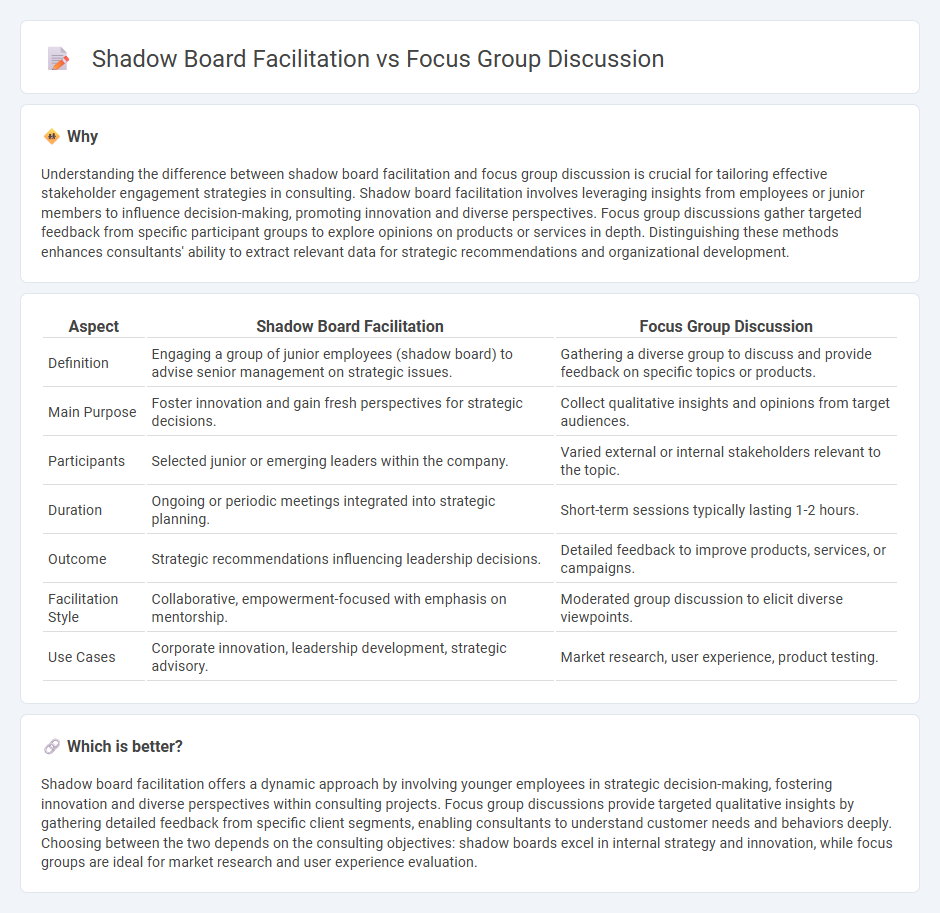
Shadow board facilitation enables emerging leaders to provide strategic insights by simulating real executive decision-making environments, fostering innovative solutions within the organization. Focus group discussions gather diverse perspectives on specific topics, emphasizing consumer or employee feedback to inform targeted improvements. Explore how these distinct methods can enhance your consulting outcomes.
Why it is important
Understanding the difference between shadow board facilitation and focus group discussion is crucial for tailoring effective stakeholder engagement strategies in consulting. Shadow board facilitation involves leveraging insights from employees or junior members to influence decision-making, promoting innovation and diverse perspectives. Focus group discussions gather targeted feedback from specific participant groups to explore opinions on products or services in depth. Distinguishing these methods enhances consultants' ability to extract relevant data for strategic recommendations and organizational development.
Comparison Table
| Aspect | Shadow Board Facilitation | Focus Group Discussion |
|---|---|---|
| Definition | Engaging a group of junior employees (shadow board) to advise senior management on strategic issues. | Gathering a diverse group to discuss and provide feedback on specific topics or products. |
| Main Purpose | Foster innovation and gain fresh perspectives for strategic decisions. | Collect qualitative insights and opinions from target audiences. |
| Participants | Selected junior or emerging leaders within the company. | Varied external or internal stakeholders relevant to the topic. |
| Duration | Ongoing or periodic meetings integrated into strategic planning. | Short-term sessions typically lasting 1-2 hours. |
| Outcome | Strategic recommendations influencing leadership decisions. | Detailed feedback to improve products, services, or campaigns. |
| Facilitation Style | Collaborative, empowerment-focused with emphasis on mentorship. | Moderated group discussion to elicit diverse viewpoints. |
| Use Cases | Corporate innovation, leadership development, strategic advisory. | Market research, user experience, product testing. |
Which is better?
Shadow board facilitation offers a dynamic approach by involving younger employees in strategic decision-making, fostering innovation and diverse perspectives within consulting projects. Focus group discussions provide targeted qualitative insights by gathering detailed feedback from specific client segments, enabling consultants to understand customer needs and behaviors deeply. Choosing between the two depends on the consulting objectives: shadow boards excel in internal strategy and innovation, while focus groups are ideal for market research and user experience evaluation.
Connection
Shadow board facilitation and focus group discussion are connected through their use in organizational consulting to gather diverse employee insights and foster collaborative decision-making. Shadow boards act as advisory groups of younger employees who provide fresh perspectives, while focus group discussions facilitate open dialogue for in-depth exploration of specific issues or ideas. Both methods enhance strategic planning by integrating grassroots feedback into leadership processes.
Key Terms
Participant Engagement
Focus group discussions typically encourage active verbal participation and diverse viewpoints by facilitating open dialogue among selected participants, fostering immediate feedback and collective brainstorming. Shadow board facilitation engages emerging leaders in strategic decision-making processes behind the scenes, promoting deeper involvement through real-world problem solving and mentorship from senior executives. Explore how each method enhances participant engagement differently to optimize your organizational development strategies.
Decision-Making Process
Focus group discussions gather diverse participant opinions simultaneously, enabling collective analysis and insight generation to inform decision-making processes efficiently. Shadow board facilitation engages younger or emerging leaders in parallel advisory roles, promoting innovative decision inputs while mirroring executive strategies for enhanced governance. Explore how these approaches uniquely influence organizational decision-making dynamics.
Generational Perspective
Focus group discussions allow diverse generational cohorts to voice their unique perspectives, fostering direct dialogue and immediate feedback on shared experiences and values. Shadow board facilitation engages emerging leaders, often from younger generations, in strategic decision-making processes, providing real-time insights into future-focused organizational challenges. Explore further to understand how these methods can be tailored to maximize generational wisdom in your business strategy.
Source and External Links
Focus Group Discussions | INTRAC - Focus group discussions are facilitated conversations with 6-12 people sharing specialist knowledge or interest, used to explore perceptions and attitudes on a topic, often lasting 1-2 hours and helpful for accessing views of minority or disadvantaged groups.
Focus Group - Wikipedia - Focus groups are a qualitative market research method using small, homogeneous groups to discuss a topic; participants are briefed, discussions recorded, and facilitated by a moderator to cover specified areas and encourage open dialogue without bias.
What is a Focus Group | Step-by-Step Guide & Examples - Scribbr - A focus group is a qualitative research method that gathers a small group of participants with shared demographic traits to share perceptions and feelings on a topic in a moderated setting; this method reveals nuanced, natural feedback helpful in social science, marketing, and user research.
 dowidth.com
dowidth.com